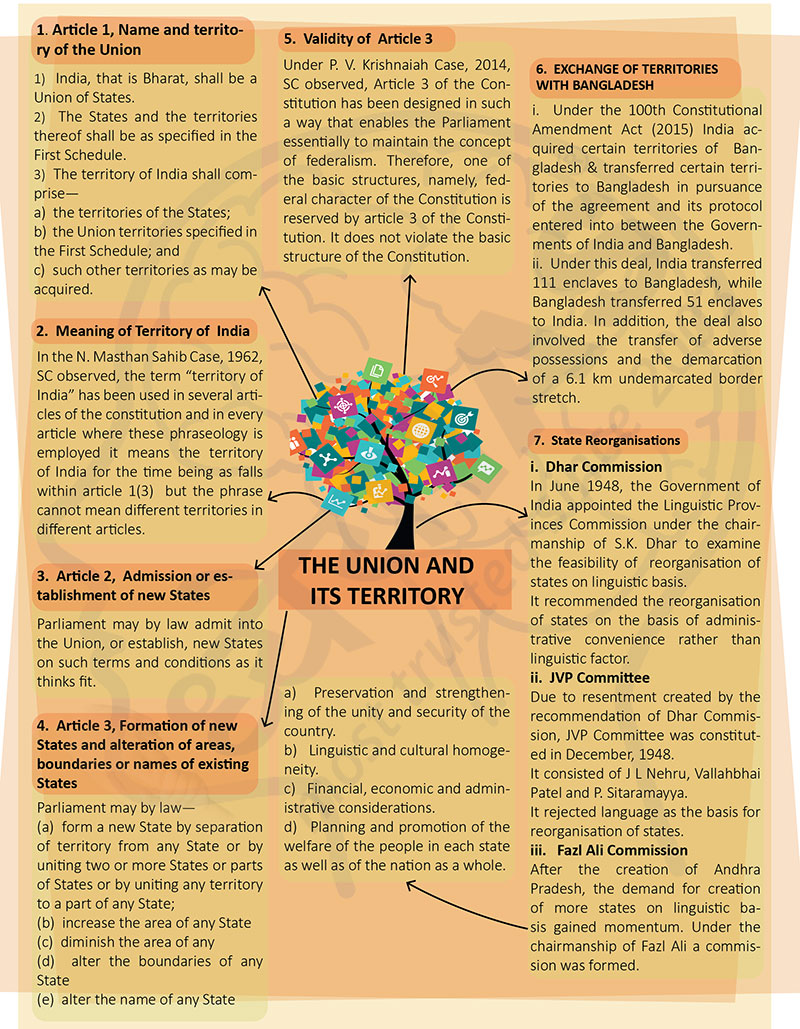Article 1, Name and territory of the Union
- India, that is Bharat, shall be a Union of States.
- The States and the territories thereof shall be as specified in the First Schedule.
- The territory of India shall comprise—
- the territories of the States;
- the Union territories specified in the First Schedule; and
- such other territories as may be acquired.
Meaning of Territory of India
- In the N. Masthan Sahib Case, 1962, SC observed, the term “territory of India” has been used in several articles of the constitution and in every article where these phraseology is employed it means the territory of India for the time being as falls within article 1(3) but the phrase cannot mean different territories in different articles.
Article 2, Admission or establishment of new States
- Parliament may by law admit into the Union, or establish, new States on such terms and conditions as it thinks fit.
Article 3, Formation of new States and alteration of areas, boundaries or names of existing States
Parliament may by law—
- form a new State by separation of territory from any State or by uniting two or more States or parts of States or by uniting any territory to a part of any State;
- increase the area of any State
- diminish the area of any
- alter the boundaries of any State
- alter the name of any State
Validity of Article 3
- Under P. V. Krishnaiah Case, 2014, SC observed, Article 3 of the Constitution has been designed in such a way that enables the Parliament essentially to maintain the concept of federalism. Therefore, one of the basic structures, namely, federal character of the Constitution is reserved by article 3 of the Constitution. It does not violate the basic structure of the Constitution.
Exchange of Territories with Bangladesh
- Under the 100th Constitutional Amendment Act (2015) India acquired certain territories of Bangladesh & transferred certain territories to Bangladesh in pursuance of the agreement and its protocol entered into between the Governments of India and Bangladesh.
- Under this deal, India transferred 111 enclaves to Bangladesh, while Bangladesh transferred 51 enclaves to India. In addition, the deal also involved the transfer of adverse possessions and the demarcation of a 6.1 km undemarcated border stretch.
State Reorganisations
i. Dhar Commission
- In June 1948, the Government of India appointed the Linguistic Provinces Commission under the chairmanship of S.K. Dhar to examine the feasibility of reorganisation of states on linguistic basis.
- It recommended the reorganisation of states on the basis of administrative convenience rather than linguistic factor.
ii. JVP Committee
- Due to resentment created by the recommendation of Dhar Commission, JVP Committee was constituted in December, 1948.
- It consisted of J L Nehru, Vallahbhai Patel and P. Sitaramayya.
- It rejected language as the basis for reorganisation of states.
iii. Fazl Ali Commission
- After the creation of Andhra Pradesh, the demand for creation of more states on linguistic basis gained momentum. Under the chairmanship of Fazl Ali a commission was formed.
- Preservation and strengthening of the unity and security of the country.
- Linguistic and cultural homogeneity.
- Financial, economic and administrative considerations.
- Planning and promotion of the welfare of the people in each state as well as of the nation as a whole.









